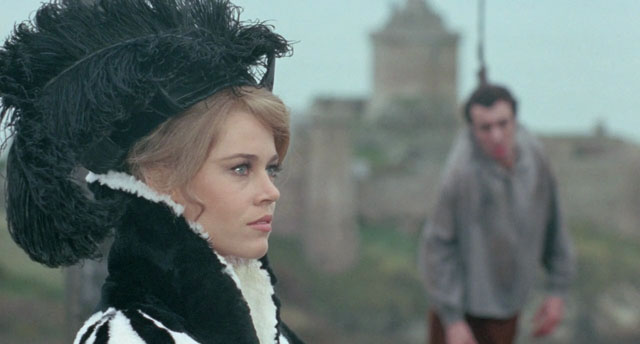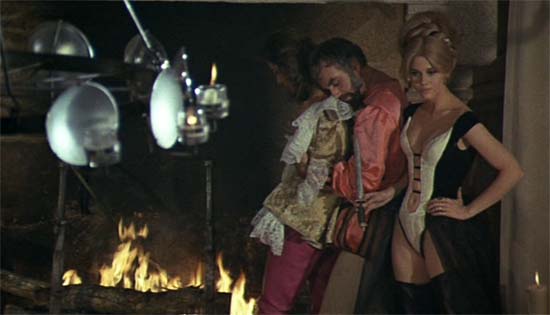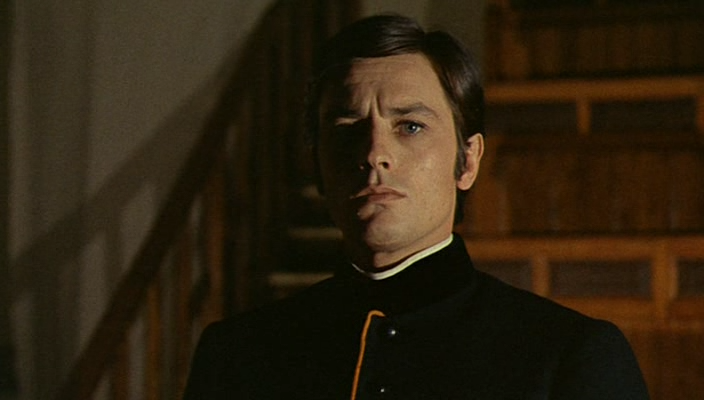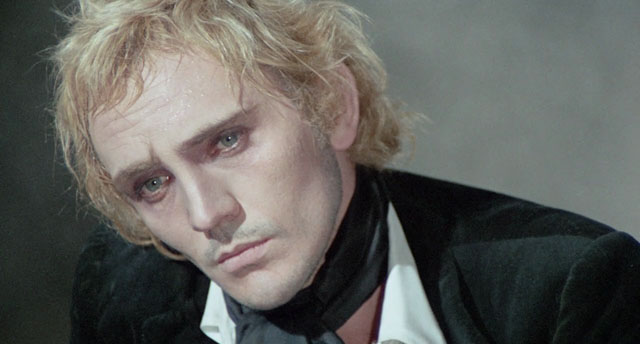If you’re obsessed with films and potter about Twitter, you might have seen director Edgar Wright’s list of his 1000 favourite movies, an inventory both admirable in scope and staggering in content. I’ve seen only about 40 percent of the films on the list (predictably, most of them made before 1970) and since I adore Hot Fuzz and Spaced, I decided to place myself in Mr. Wright’s hands and watch a film I’d never heard of, solely on the strength of his recommendation. My first experiment: Spirits of the Dead.
Spirits is an anthology film comprised of stories based on three tales by Edgar Allan Poe: ‘Metzengerstein’, ‘William Wilson’ and ‘Never Bet the Devil Your Head’. The segments star Jane Fonda, Alain Delon, Terence Stamp and Brigitte Bardot and were directed by Roger Vadim, Louis Malle and Federico Fellini. Some adaptations are more faithful than others. Some are more absorbing than others. Each is deranged in its own unique way.
The film begins with ‘Metzengerstein’ and the Countess Frederique de Metzengerstein (Jane Fonda): tyrant, libertine and outré fashion plate. Frederique whiles away the hours terrorizing her servants and seducing her guests—and sometimes vice-versa. Her run of constant gratification is interrupted by a chance meeting with her cousin, Baron Wilhelm Berlifizing, a horse-loving recluse. She falls madly in love with him; he refuses her. She burns down his stables, inadvertently killing him, and becomes obsessed with a horse that escaped the blaze: a mysterious black stallion that only she seems able to tame.
‘Metzengerstein’ makes no pretence of sanity. It’s florid, provocative, and for all its flaunted excesses, strangely inert. Blood is shed (and drunk) and much debauchery implied, but Vadim’s adaptation lacks a pulse. In his campaign to scandalize viewers, he achieves the remarkable: he makes Poe bland. The only sign of life is Jane Fonda, who throws herself into Frederique’s wild mood swings, declaims clunky dialogue as if it were Shaw and serenades a horse with a lute. Vadim rewards her with a wardrobe so outrageous it likely occupied more of his time than her performance. In one set piece, she wanders through an orgy wearing a dress that reveals more of her cleavage and midriff than it conceals, before coming to rest beside a multi-tiered cake. Nothing says decadence quite like a skimpy outfit and an elaborate dessert cut daintily in half. ‘Metzengerstein’ is so helplessly twee that its only real shock caught me completely off guard: Berlifizing is played by Fonda’s brother, Peter.
The implications of siblings playing lovers are so unnerving that it’s a relief when the film moves on to ‘William Wilson’ and the comparative safety of doppelgangers and homicide. William Wilson (Alain Delon) has a problem. Ever since he was a boy, he has been stalked by a double, another William Wilson (also Delon) who insists on thwarting whatever sinful schemes Wilson the first has wrought. This makes it difficult for Wilson to be satisfyingly wicked. As the years pass and he finds himself hounded from school to university and then to the army, Wilson grows resentful of his shadow and decides to be rid of him.
‘William Wilson’, directed and co-written by Louis Malle, is the most faithful of the three adaptations, though not the most absorbing. Its chief virtue is Alain Delon. One of the most strikingly handsome men ever to have stepped in front of a camera, Delon also possesses an almost other-worldly charm. Like Jean Marais, he has the sort of face you imagine a prince of the fair folk would have: beautiful, and under the right light, a little unsettling. His unearthliness is on full display as Wilson, along with a perversely charismatic blend of hauteur and sadism. When Wilson abducts a young woman and straps her to an operating table with the intension of vivisecting her, his classmates merely crowd round in anticipation. Ostensibly sane men become monstrous under his thrall. Unfortunately, what Malle gains in Delon he squanders on a lumbering plot that goes nowhere, and takes its time getting there. Even Wilson’s high-stakes card game with a courtesan (Brigitte Bardot) comes across less as a battle of wills and more as two handsomely-dressed actors declaiming their lines for the benefit of the extras. Malle was one of France’s most eclectic directors (Elevator to the Gallows, My Dinner with André, Zazie dans les metro) and it’s a shame he found so little to spark his creativity here.
The same can’t be said for Federico Fellini. ‘Toby Dammit’, co-written and directed by Fellini, is a wildly imaginative interpretation of ‘Never Bet the Devil Your Head’. Toby Dammit (Terence Stamp) is a British film star visiting Rome. He meets the backers of his new film, gives a television interview and attends an awards gala. All perfectly straightforward—except Toby is losing his mind.
‘Toby Dammit’ is undoubtedly the best of the three episodes and likely the reason Wright recommends the film. Fellini uses Poe as a springboard for a fever dream: La dolce vita, if Anita Ekberg was a cadaverous alcoholic unravelling at the seams. The disorientation sets in early, as Toby touches down at an airport whose moorings have come loose from reality. A round monitor hangs from the ceiling like a giant eye, displaying an image of a woman that hovers about like a misaligned spotlight. Two men, one crouched in a foetal position, sit surrounded by lifeless figures, wrapped in plastic, while a jaunty Nino Rota tune (later recycled for The Godfather) plays. In walks Toby, a wraith in funereal black; Stamp plays him with a brittleness verging on mania. Adrift in a swirl of press junkets and showbiz hypocrisy, Toby begins to resemble the figure in Munch’s The Scream: a lost soul howling into the void. Poe would approve.
Spirits of the Dead is a cinematic curate’s egg that’s far less than the sum of its parts. If you must watch it, see it for ‘Toby Dammit’, one of the most terrifying depictions of mental illness I have ever seen. Like the best of Poe’s stories, it worms its way into your mind—and lingers.




Leave a Reply